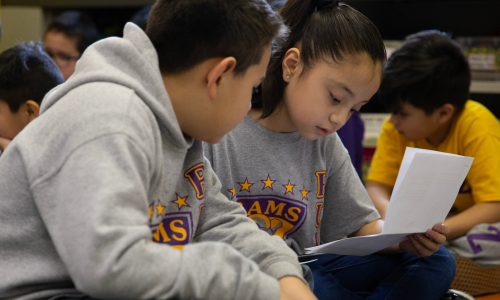
I wouldn’t argue that there are any number of different descriptions that could accurately define what goes into making great teachers great. Certainly passion for the subject they teach; compassion for their students; and a desire to see their classrooms come alive with comprehension. I would suggest that one key ingredient is that great teachers do less teaching and more empowering.
The old adage that less is more is certainly at the heart of self assessment and self-regulation, one of the cornerstones of successful formative assessment. While it goes without saying that teachers teach, getting out of the way and giving students the means and opportunity to self assess and self-regulate their thinking, learning, and work – not only individually, but also with other students – can have a huge impact on meeting their learning targets.
Teachers need to empower their students and give them a leading role in their own education. It’s no doubt that most students are their own biggest critics, and that’s okay; focusing that lens can have fantastic results. By engaging in the process of thinking about and assessing their own work, they act on the evidence of their own learning and take responsibility for it.
Student self assessment as a part of a teacher’s pedagogical toolbox has broad intuitive appeal. It would seem to encourage metacognitive processes that are important for the deep learning required of 21st century students. But does it work?
…students who engage in these activities are more likely to develop internal attributions, a feeling of empowerment, and a sense of autonomy.”
Research on the self-regulation of learning, including self assessment and self-monitoring, indicates that students who engage in these activities are more likely to develop internal attributions, a feeling of empowerment, and a sense of autonomy. One study in particular by Fernandes and Fontana in 1996 (Changes in the control beliefs in Portuguese primary school pupils as a consequence of the employment of self-assessment strategies. British Journal of Educational Psychology, 66, 301–313) established a training program of self-assessment strategies with 25 primary school teachers. Over a period of eight months, the teachers implemented these strategies within their classrooms. Students in these classrooms were compared to students in the classrooms of 20 control teachers. Results indicated that students who are provided with regular opportunities and encouragement to engage in self-assessment are more likely to attribute their learning to internal beliefs; that is, students believe they can have an impact on their own learning. These students were less likely to attribute success to luck or other unknown variables and were more likely to identify the real causes of academic success.
In 2004 Sue Brookhart and some of her colleagues examined the impact of student self-monitoring on 41 students in two classrooms. Students were provided with structures and tools (logs, graphs, reflection sheets, etc.) to reflect each week on the success of their studying and problem-solving strategies. An analysis of student reflection sheets showed that when teachers involved their students in monitoring their own progress, students were more autonomous and were able to accurately predict their performance on timed tests. Overall, the students in this study enjoyed participating in self-assessment and liked seeing their progress. Student comments on their reflection sheets (think about Exit Tickets here) also acknowledged the value of their own studying. (Minute Math: An action research study of student self-assessment. Educational Studies in Mathematics, 57, 213–227.)
This student-directed learning is what sets the stage for students owning their learning, which is a constant cry from the classroom . . . from them and from us. So while teachers need to teach, they shouldn’t be the ones doing all the work. As Robyn Jackson says,
Never work harder than your students.







